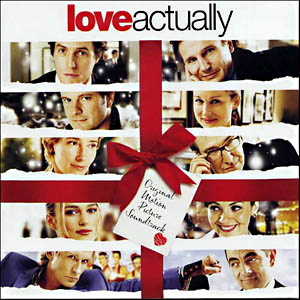“Love Actually” is as stuffed with goodies as the Christmas stockings for those at the very top of Santa’s “nice” list — and it is just as entertaining, too.
You say you like romantic comedies with gorgeous stars, witty dialogue delivered in swoon-worthy English accents, and oodles of happy endings? This movie gives you ten at once. And yet none of the stories ever feels hurried or incomplete.
The interwoven stories all take place in the weeks before Christmas and cover many kinds of love, touching, tender, sweet, charming, funny, and bittersweet. They include a Prime Minister (Hugh Grant) who is drawn to the outspoken girl who delivers his tea, an eleven-year old (Thomas Sangster) who wants to attract the attention of the coolest girl in school, a man in love with his best friend’s new bride, a waiter who is sure that all his dreams of romance will come true if he goes to America, a thoroughly married man (Alan Rickman) whose flirtatious secretary is making him wonder how thoroughly married he is, a rock star (Bill Nighy) angling for a comeback with a cheesy Christmas single, a heartbroken writer (Colin Firth) who can’t stop thinking about the woman who cleans his house, even though they don’t understand each other’s languages, and a couple who meet at work as movie stand-ins assigned to increasingly (and hilariously) more intimate poses.
Richard Curtis, who wrote Four Weddings and a Funeral and Notting Hill for the first time directs his own screenplay with heart and style. It helps, of course, that he has a dream cast, including newcomer Sangster, a real-life cousin of Hugh Grant and already a first-rate actor and a knock-out screen presence. Each of the actors creates complete, endearing, vivid, and vulnerable characters that we will remember long after we have forgotten most “stars” who spend two full hours onscreen in the latest multiplex fodder.
The movie begins with the Prime Minister musing on the arrivals section of the airport and the love everywhere as people are reunited with those who are most precious to them. This theme continues with a faded rock star (the magnificent Nighy) recording a silly Christmas version of “Love is All Around” (also featured in Four Weddings and a Funeral). But other themes just as important can be summed up somewhere between the words of W.S. Gilbert — “Faint Heart Never Won Fair Lady” and a celebration of what one character not unhappily calls “the total agony of being in love.”
This is a movie about taking big chances (both hopeful and hopeless), about making big gestures to show our love, and about big, big feelings that may make us crazy and miserable but remind us that we are alive and why we are alive.
For one man and woman, the inability to communicate in words may be what allows them to sense how much they really belong together. We see in subtitles what they really want to say to each other, but more important, we see on screen what they say to each other with their eyes and the way their breathing changes when they look at each other. Other couples both speak English but still somehow cannot find the words to let each other know how they feel. One ardent soul reaches out through music. Another…just reaches out. Characters also grapple with non-romantic love, including parental, sibling, and deep friendship. They grapple with temptation and conflicting loyalties. And all of them carry our hearts with them.
In addition, any movie that manages to include a child dressed as a Nativity lobster, a Bay City Rollers song played at a funeral, love-emergency lessons in both drums and Portugese, and Hugh Grant dancing through the halls of 10 Downing Street to the Pointer Sisters is worth seeing at least twice.
Parents should know that the movie’s R rating comes from some very strong language, sexual references and non-explicit sexual situations, including prostitutes and adultery. There is humorous nudity when stand-ins for what appears to be a soft-core porn movie chat politely as they are posed in increasingly intimate positions. A character’s history of sex, drugs, and rock and roll is played for humor. There are some tense and sad scenes. Some audience members may object to the portrayal of the American President (Billy Bob Thornton) as a crude bully. One of the movie’s many strengths is its matter-of-fact portrayal of loving inter-racial friendship and romance.
Families who see this movie should talk about how the characters handle their feelings of loss, longing, and fear.
Families who enjoy this movie will also enjoy the other Curtis movies as well as classic romantic comedies with more emphasis on romance than comedy like “Moonstruck,” “Roman Holiday,” and “The Philadelphia Story.”

